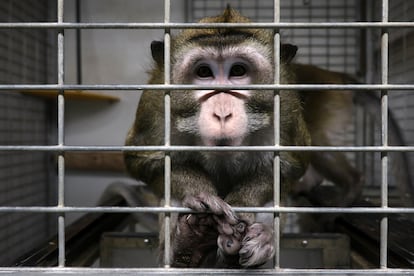Spain approves new law recognizing animals as ‘sentient beings’
Thanks to the legislation – which was only opposed by the far-right Vox party – pets and wild species will no longer be considered ‘objects’ in the Spanish Civil Code

Animals in Spain will no longer be considered “objects” by the law thanks to new legislation passed on Thursday by Spain’s lower house, the Congress of Deputies.
From now on, animals will be treated as “sentient beings,” and as such will have a different legal status than an inanimate object. They will no longer be able to be seized, abandoned, mistreated or separated from one of their owners in the case of a divorce or separation, without having their wellbeing and protection taken into account.
The new law to modify the legal framework of animals was approved on Thursday with wide support from Spain’s Congress – only the far-right Vox party voted against the measure. The legislation changes the Civil Code, Mortgage Law and Civil Procedure Law, and broadly applies to all animals, whether they are domesticated or wild.
Animals were already recognized as sentient beings, with rights and interests that must be taken into account, in European law, regional administrative laws and even Spain’s Criminal Code. But this recognition was not present in the Spanish Civil Code, which covers issues relating to property, family and obligations. This meant that lawyers did not have a legal basis to address certain problems, such as what to do with pets in divorce cases.
“It’s a step forward and it says that in separations and divorces, the arrangement that will be applied to the animals will take into account not only the interests of the humans, but also of the animal,” explained María González Lacabex, from INTERcids, a legal organization specializing in animal protection.
We are the only species that recognizes the suffering of others and as such we have an obligation to prevent that sufferingGuillermo Díaz, Ciudadanos lawmaker
The process to get the law approved has been long and winding. It was first proposed in 2017, but did not move forward due to the upheaval caused by Spain’s two general elections in April and November of 2019. It was not until April of this year that the initiative appeared before Congress, where it was supported by all parties except Vox. In September, the law was then approved by Spain’s upper house, the Senate, which introduced some modifications. And on Thursday, it was given the final green light by Congress.
The conservative Popular Party (PP) largely supported the text of the document, but warned the coalition government, which is led by the Socialist Party (PSOE) and junior partner Unidas Podemos, that it will not back greater protections for animals. The warning was in reference to the Social Rights Ministry, headed by Ione Belarra from Unidas Podemos, which is preparing a draft for a new animal welfare law that includes stricter measures to prevent animal trafficking and abuse.
Teresa Aguada, a lawmaker from the PP, called on the Socialists not to “cede to the extremist pressure of your partners [Unidas Podemos] to attack our traditions, culture and rural world.”
Most of Spain’s congressional parties, however, welcomed the law’s approval. “It’s a moral victory in a country where 200,000 animals are abandoned each year,” said Juantxo López de Uralde, from Unidas Podemos.
Sonia Guaita, from the PSOE, pointed out that similar legislation exists in most European countries, adding: “Those who are violent against animals are potentially violent against humans as well.”
Guillermo Díaz, from the center-right Ciudadanos (Citizens), also defended the law. “We are the only species that recognizes the suffering of others and as such we have an obligation to prevent that suffering,” he said, explaining that up until now, “animals were not considered different from a television” in divorce cases.
The sole voice of dissent came from Vox lawmaker Ángel López Maraver, who is the former president of the Spanish Hunting Federation. He described the law as “insanity, nonsense, stupidity. It humanizes animals and dehumanizes man.”
Tu suscripción se está usando en otro dispositivo
¿Quieres añadir otro usuario a tu suscripción?
Si continúas leyendo en este dispositivo, no se podrá leer en el otro.
FlechaTu suscripción se está usando en otro dispositivo y solo puedes acceder a EL PAÍS desde un dispositivo a la vez.
Si quieres compartir tu cuenta, cambia tu suscripción a la modalidad Premium, así podrás añadir otro usuario. Cada uno accederá con su propia cuenta de email, lo que os permitirá personalizar vuestra experiencia en EL PAÍS.
¿Tienes una suscripción de empresa? Accede aquí para contratar más cuentas.
En el caso de no saber quién está usando tu cuenta, te recomendamos cambiar tu contraseña aquí.
Si decides continuar compartiendo tu cuenta, este mensaje se mostrará en tu dispositivo y en el de la otra persona que está usando tu cuenta de forma indefinida, afectando a tu experiencia de lectura. Puedes consultar aquí los términos y condiciones de la suscripción digital.








































